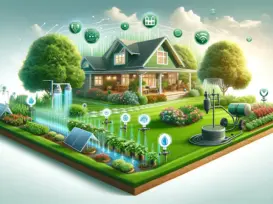Grus Home Energy - Smart Gardening
Revolutionize Your Green Thumb: Embrace the Future with Smart Gardening Innovations
Revolutionize Your Green Thumb: Embrace the Future with Smart Gardening Innovations
Gardening has been a beloved pastime for generations—a way to connect with the earth, grow fresh produce, and beautify our surroundings. However, as technology has evolved, so too has the art of gardening. Smart gardening is a revolutionary approach that incorporates technology to make gardening more efficient, productive, and enjoyable. It’s all about using resources in a smarter way to benefit both the plants and the gardener.
One of the most significant advantages of smart gardening is the ability to automate many of the tasks that were previously labor-intensive. For instance, smart irrigation systems can be programmed to water your plants at the most effective times of day, which not only saves you time but also conserves water. These systems can even adjust watering schedules based on real-time weather conditions, avoiding overwatering on rainy days, or increasing hydration during droughts.
Moreover, smart gardening takes the guesswork out of plant care. With sensors that monitor soil moisture, light levels, temperature, and nutrient content, gardeners can receive detailed insights into their garden’s condition. This information can be sent directly to a smartphone or computer, allowing you to make informed decisions about when to water, fertilize, or adjust the placement of plants to maximize their exposure to sunlight.
Another aspect of smart gardening is the use of data analytics and artificial intelligence to predict plant growth and health issues. By analyzing patterns and providing recommendations, these systems can help prevent diseases or infestations before they become serious problems. This proactive approach to plant care not only saves time and resources but can also increase the yield and quality of your garden’s output.
The integration of smart garden technology also opens up new possibilities for urban and indoor gardening. Hydroponic and aquaponic systems, which grow plants in water without soil, can be fully automated and monitored through smart devices. This can lead to bountiful harvests in spaces where traditional gardening would be impossible. Compact, counter-top smart garden units can even allow individuals living in apartments without outdoor space to grow fresh herbs and vegetables year-round.
For those looking to reduce their environmental footprint, smart gardening can be a powerful tool. By optimizing resource use and reducing waste, these technologies can make a significant impact. For example, smart composters can efficiently break down kitchen scraps into nutrient-rich fertilizer for your garden, closing the loop on your food cycle. In addition, solar-powered gardening devices can reduce reliance on the electrical grid, providing a more sustainable and cost-effective solution.
The social aspect of gardening should not be overlooked, and smart gardening can enhance this as well. Online communities and gardening apps connect gardeners from around the world, allowing them to share tips, successes, and challenges. These platforms can also facilitate the exchange of seeds and plants, promoting biodiversity and the spread of knowledge.
In essence, smart gardening is about more than just convenience; it’s a comprehensive approach to modern horticulture that empowers gardeners at all levels to achieve better results with less effort. Whether you’re a seasoned green thumb looking to streamline your garden management or a novice eager to cultivate your first plants, smart gardening tools and technologies can help you create a thriving garden suited to the demands of the 21st century.
In conclusion, smart gardening represents the symbiosis of nature and technology, where the ancient practice of growing plants meets the cutting-edge advancements of our time. By embracing these innovations, gardeners can not only improve their own experience and efficiency but also contribute to a more sustainable and food-secure future. As we continue to face global challenges such as climate change and urbanization, smart gardening stands as a testament to human ingenuity and our enduring connection to the earth.
©2025 All Rights Reserved. Grus IoT Co.,Ltd.
